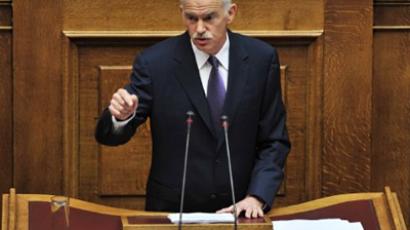Greek debt crisis in eleventh hour

With global markets still subdued on fears of possible fallout from the Greek debt crisis Business RT spoke with Nigel Rendell, Senior Emerging Markets Strategist from RBC Capital about the key issues and implications for Russia.
RT: Greek parliament is considering a five year austerity plan this week. Why haven't they got round to doing it sooner? NR:“Well I think they have been trying to do it for quite a long period of time, stretching back over a few years.The problem in Greece is that we have had a lot of political difficulties, we have had problems with the statistics, which have misinformed both the government and the international community, so that they’ve been living at the 11th hour for quite some time.But I think we are now really at five minutes to midnight.There is no alternative, they really do have to press ahead with this austerity plan, because the alternative is almost too awful to contemplate.”RT: Privatisation is a key component – but many see it more as a fire sale, and it's being compared to the selling of Russian state assets in the 1990s.NR:“Yes, I guess there are some similarities along that route but when you’ve got your back against the wall, like the Greek government has, there really are few alternatives to contemplate. They need to raise cash, they need to cut spending pretty dramatically, and they need to do it very, very quickly.So it may be a bit of a fire sale, but there aren’t a lot of alternatives.”RT: What are the chances the Greek problems will start a chain reaction?NR:“Well, there is always that risk and the markets are very nervous over recent days and recent weeks.The Greek situation has dominated sentiment on a daily basis and forced equity markets and FX markets in various directions.If they don’t push through this austerity programme in the course of this week we could see much more substantial impact on financial markets with a negative reaction, obviously.” RT: If Greece defaults, what effect will that have on investor sentiment towards Russia? NR:“I think investment sentiment, not just towards Russia but on a global basis would obviously deteriorate fairly quickly, and quite substantially.Having said that we have been talking about this situation for quite some time – I am not sure if we should mention default at this stage because there is a chance that we may get some sort of bailout from the EU, from the IMF, there is a plan that the French have started to put together.So there are contingency plans.The question is can they be brought into operation quickly enough to save the financial markets.”














